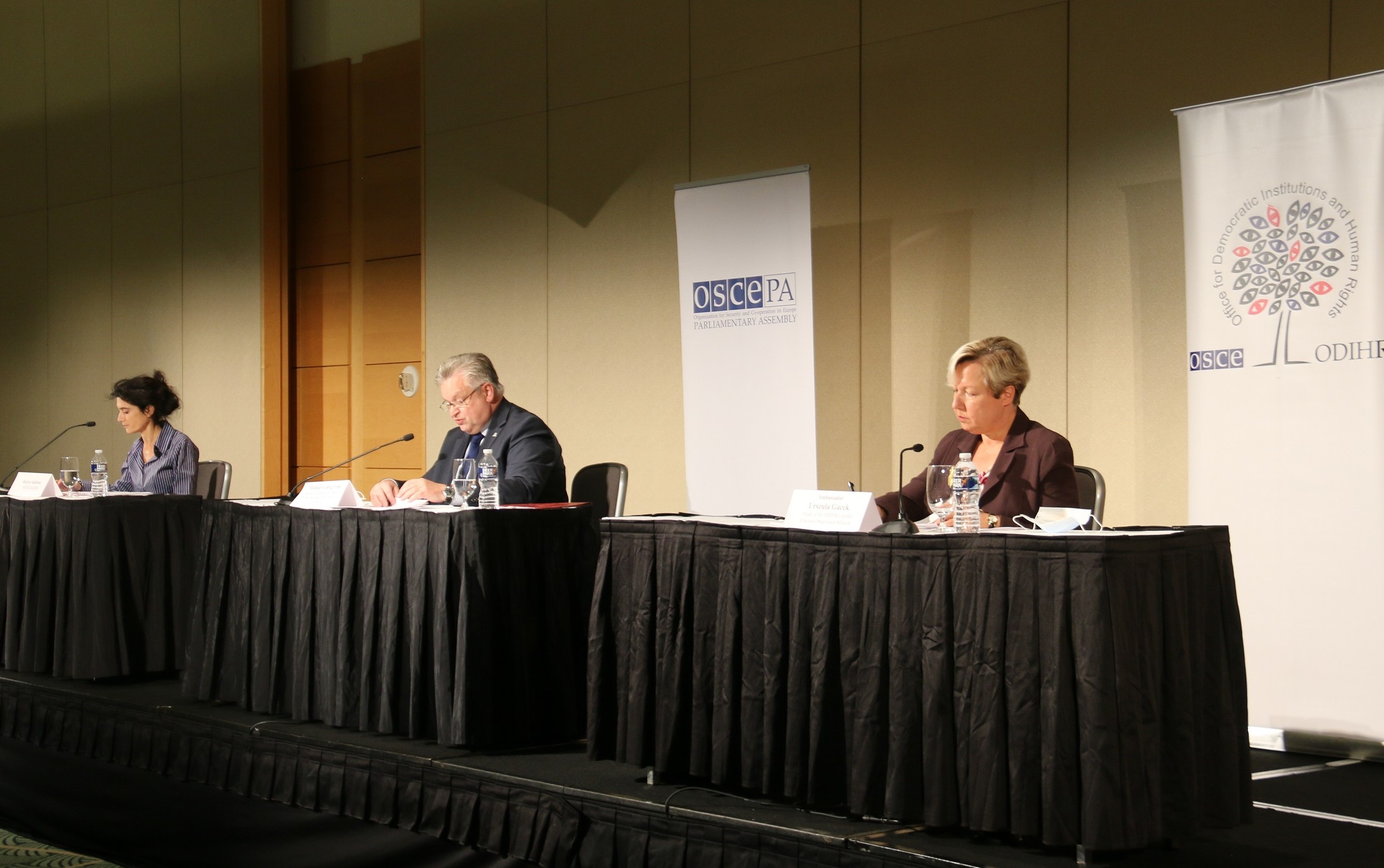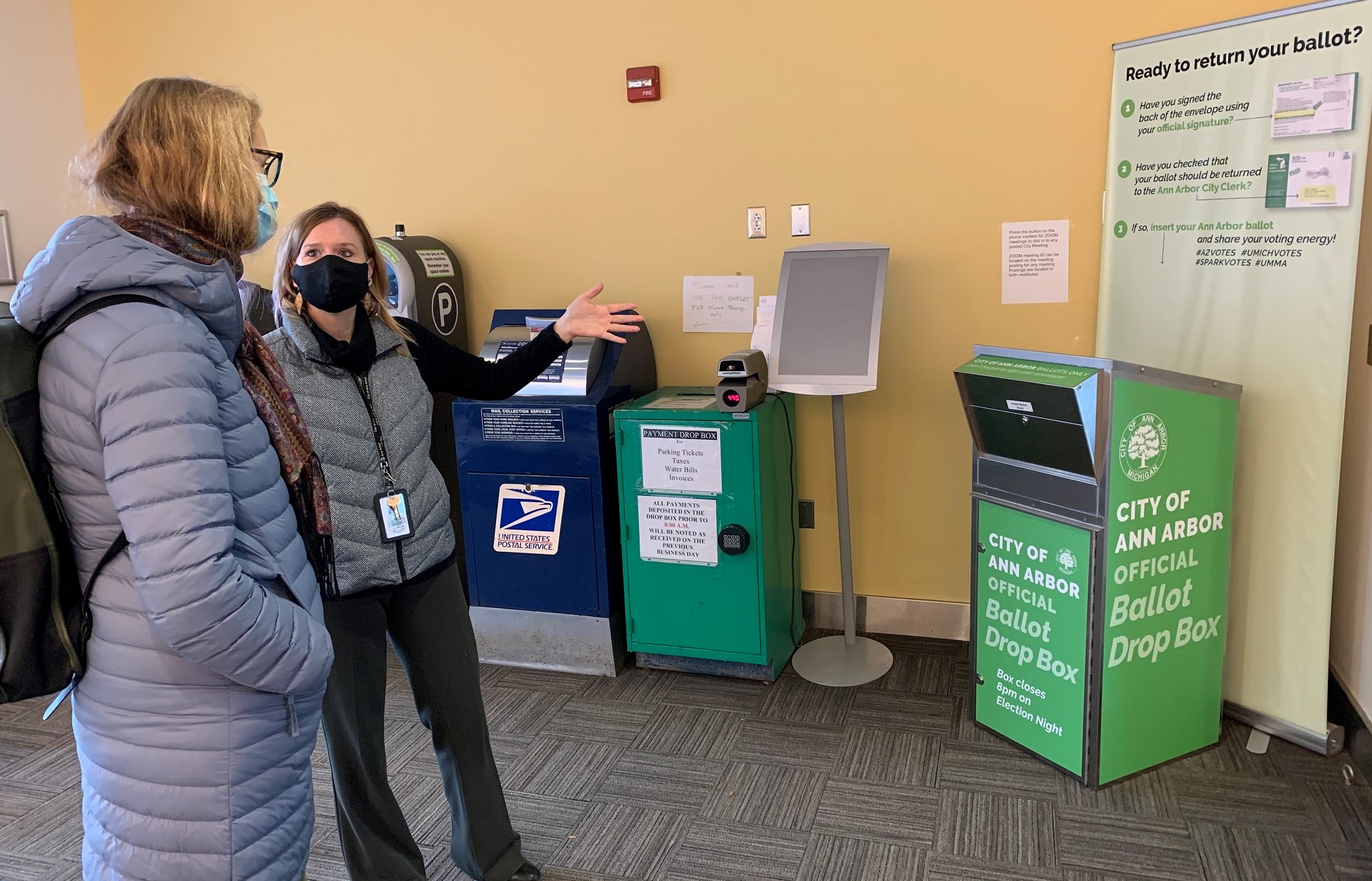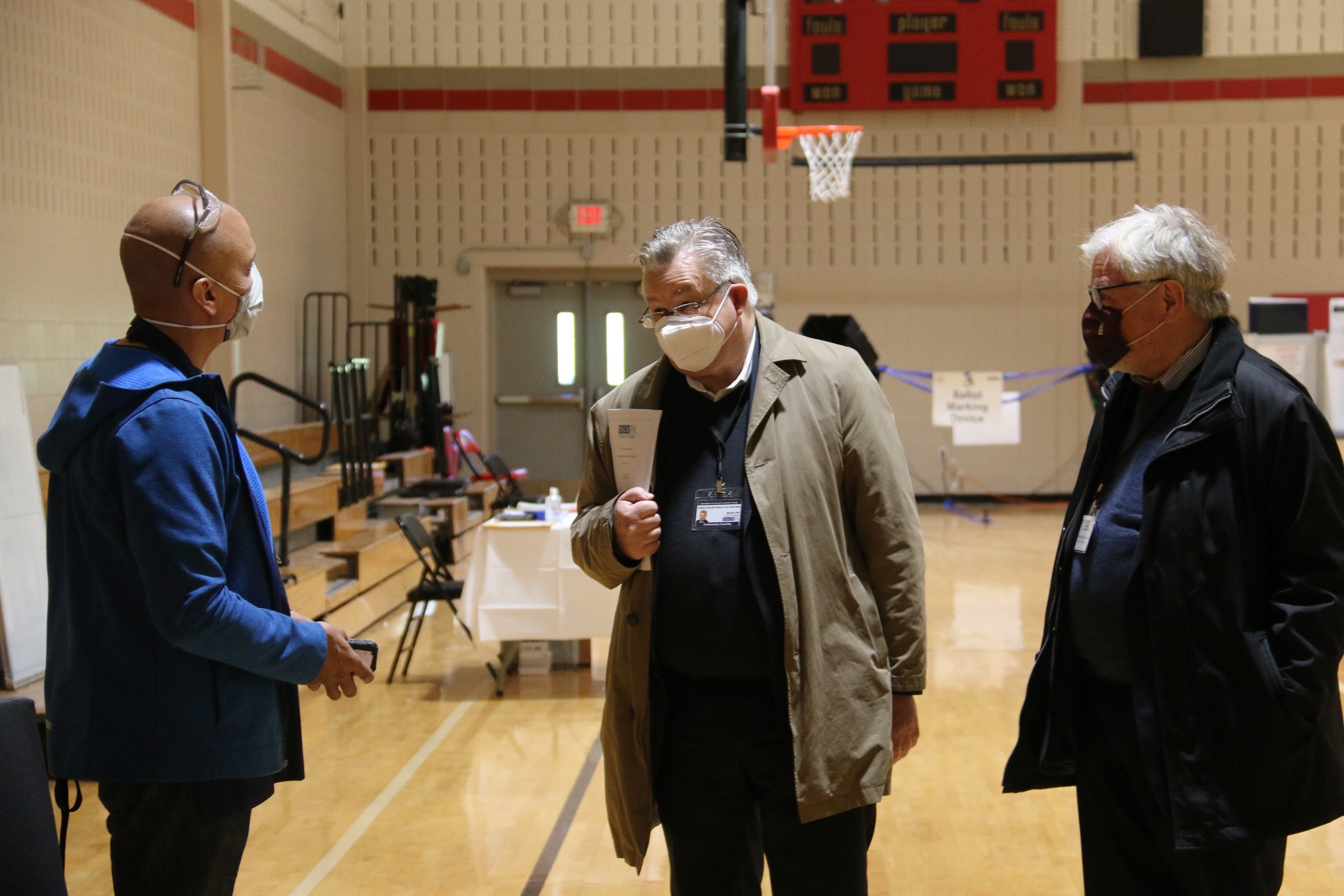By Emma Derr, Max Kampelman Fellow
and Robert Hand, Senior Policy Advisor
The U.S. election system has passed the “extreme stress test,” according to the head of the 2020 general election observation mission organized by the Organization for Cooperation and Security in Europe.
International observers representing 39 OSCE participating States presented their preliminary conclusions at a press conference on November 4, 2020 in Washington D.C. The observation mission is a joint effort between the OSCE Office for Democratic Institutions and Human Rights (ODIHR) and the OSCE Parliamentary Assembly (PA).
Ambassador Urszula Gacek of Poland, who led the ODIHR observers, said the U.S. electoral system had been subjected to an “extreme stress test” this year due to COVID-19 and the polarized political climate. While announcing the mission’s findings, she concluded, “The American electoral process appears to have passed that test.”

Observers deliver the post-election statement in Washington D.C. Photo courtesy of the OSCE PA.
In 1990, all OSCE participating States pledged to hold free and fair elections and to invite international observers. To meet this OSCE commitment, in March 2020 the U.S. Department of State invited the OSCE to observe the November 3 elections. As part of the OSCE election observation process, the observers focus their reporting on issues such as legal framework, election administration, new voting technologies, campaign environment and finance, and coverage of elections by media. Recommendations are then issued to improve the electoral processes to benefit citizens.
“The United States is leading by example, showing that election observation is a way to promote democracy both at home and abroad,” said OSCE Parliamentary Assembly member Michael Georg Link, who served as Special Coordinator and leader of the short-term observer mission.
This is the ninth election the OSCE has observed in the U.S. since 2002.
The OSCE began its work during the summer of 2020 by conducting a comprehensive review of the electoral process. A Needs Assessment Report was published in July, which recommended observation. Once the core team of the observation mission was deployed, an Interim Report was released in October.

Head of OSCE PA election observation mission Kari Henriksen in Ann Arbor, Michigan in October. Photo courtesy of the OSCE PA.
The Needs Assessment Report noted “the conduct of these elections will be the most challenging in recent decades” and that “in a highly polarized environment, there is an increased need for external and independent overview of the electoral process, including of the election day proceedings.”
ODIHR sent a limited election observation mission (LEOM) to the United States on September 29, which included observing early voting. The core team was comprised of eleven experts from ten participating States, led by Gacek.
On election day, 50 observers were deployed by ODIHR, alongside 65 observers that included parliamentarians and support staff from the OSCE PA, to 30 states and the District of Columbia.

Michael Georg Link and Andreas Nothelle speak with a poll worker at a polling station in Washington D.C. on Election Day. Photo courtesy of the OSCE PA.
Despite the challenges, the OSCE team was confident it produced a thorough, impartial, fact-based assessment. As Link noted, the OSCE’s role is not to draw a “thumbs up, thumbs down” political conclusion or compare results to other countries or even to previous elections in the same country.
The mission hopes to foster post-election dialogue about its recommendations, and a final report is expected in January 2021. All OSCE election observation reports are accessible on the OSCE website.
Findings
Overall Assessment
The OSCE’s Preliminary Report concluded that the November 3, 2020 general elections were free and fair, as well as “competitive and well managed despite legal uncertainties and logistical challenges.”
It also noted that the pluralistic and diverse media provided comprehensive coverage of the campaign. Freedom of expression was respected, and a wide range of available election-related information enabled voters to make an informed choice.
Early and postal voting was significantly expanded, allowing for higher voter participation amid the COVID-19 pandemic. The work of election administration under difficult circumstances “enjoyed general confidence.”
The elections were “extensively observed” by both partisan and non-partisan citizen observers, which increased the transparency of the election process. The preliminary report stated, “Election day was orderly and took place in a peaceful atmosphere without unrest or intimidation. Mitigating measures against the pandemic were generally in place and followed.”
Any interruptions at polling places due to problems with voting equipment were quickly addressed.
Political Polarization
The 2020 presidential campaign was characterized by deep political polarization. During the year, controversy arose regarding the conduct of elections amid the COVID-19 pandemic which took hold in February and March. The death of George Floyd in Minneapolis in late May elevated calls for racial justice, leading to peaceful protests as well as confrontation and instances of violence.
The OSCE/ODIHR Election Observation Mission 2016 Final Report said that the last presidential campaign was characterized by harsh personal attacks and intolerant rhetoric by one candidate, a trend that continued in 2020. This year’s preliminary findings highlighted the incumbent president’s “discriminative and pejorative statements” and also noted that “the two leading presidential candidates accused each other of corruption, fraud, working for foreign interests, an inability to lead, and support for extremist groups.”
Overall, the international election observers concluded that this rhetoric shifted the focus away from policies and party platforms and toward negative campaigning.
Legitimacy of Elections
The 2020 Interim Report noted that many ODIHR election observers expressed concerns about the “the incumbent President’s repeated allegations of a fraudulent election process and postal vote in particular.” This led to concern over public trust in the process and outcome as well as the potential for political violence in the aftermath of elections.
At the November 4 press conference, Link stated that “baseless allegations of systematic deficiencies, notably by the incumbent President, including on election night, harm public trust in democratic institutions.”
Link and Gacek both said that the OSCE’s observations will be ongoing as the votes continued to be counted.
“Nobody – no politician, no elected official – should limit the people’s right to vote. Coming after such a highly dynamic campaign, making sure that every vote is counted is a fundamental obligation for all branches of government,” said Link.
Alternative Voting
The preliminary findings indicate “an unprecedented volume of litigation over voting processes in the months before the elections, with over 400 lawsuits filed in 44 states.” The report states that such litigation, focusing on minimizing the COVID-19 health risks of in-person voting, created uncertainty and placed undue burden on voters and election officials. Despite these obstacles, opportunities to vote early were expanded due to the pandemic.
The interim report said that even though there was concern over the level of preparedness of election officials with minimal exposure to postal votes, many states allowed absentee ballots to be processed before election day and allowed voters to correct mistakes that may have otherwise led to ballot rejection.
According to the preliminary report, “Early voting was conducted in-person in 39 states and the District of Columbia, with voting periods ranging from 45 to 3 days. Long queues were reported in a number of states. All states provided voters with the option to cast a postal ballot…By election day, more than 100 million voters had already cast their votes.”
The OSCE observed the processing and handling of postal ballots and reported no indication of systemic problems or issues.
Secrecy of the vote is not guaranteed by all states for postal and out-of-country electronic voting, which the report—in line with several previous EOM reports—notes does not align with OSCE commitments.
Election Observation
On election day, the OSCE observed the election process and visited a limited number of polling stations.
According to the preliminary report, “Election day was observed by numerous partisan and non-partisan citizen observers across the country, with rights and responsibilities ranging from observing signature and ballot verification to challenging the eligibility of a voter or of individual ballots.”
Gacek lauded the enormous effort made by election workers and citizens working the polls, as well as a record voter turnout amidst pandemic challenges and legal uncertainty.
“We were received very favorably — made to feel very welcomed,” said Gacek.
Five states and the District of Columbia permit observation by international observers by law, and eighteen states restrict observation. During the press conference, Link noted that there are a number of states where international election observers are not allowed inside polling premises.
The OSCE has noted these restrictions since its 2004 report. Link said that he hoped state laws would be amended to allow for international observer access, as the current restrictions are not in line with OSCE commitments.
However, Article 1 of the U.S. Constitution devolves the responsibility to conduct elections to the states. As a part of this power, each state has different laws about election observers. Some do not allow international election observers into polling places. Other states do, but most are silent on the matter, leaving it to the discretion of election officials.
Disenfranchisement
Disenfranchisement has been an issue raised by OSCE election observation missions since 2008. For example, the OSCE noted that U.S. residents of the District of Columbia and overseas territories do not have voting representation in Congress. Also, an estimated 5.2 million citizens are not permitted to vote due to criminal convictions, even after serving their sentence. The OSCE notes that this restriction disproportionately affects African Americans and violates the principles of universal suffrage.
Voter Registration and Identification
As stated in previous reports of OSCE election observation missions to the United States, 2020 observers concluded in the “Statement of Preliminary Findings and Conclusions” that voter registration and identification requirements can be unduly restrictive for certain groups of citizens, such as Native Americans and low-income citizens. Identification documents are required in 34 states.
Campaign Finance
Since 2008, OSCE reports on U.S. elections noted a high level of campaign spending; this year, the mission estimated that campaign expenditures were expected to reach $14 billion. OSCE concerns include campaign finance laws that facilitate a lack of donor transparency and unlimited spending of Super PACs.






